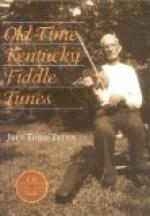But he had not counted on old Neb. The darkey found in this emergency the opportunity for which he had been waiting many years. Lapse of time had never dulled his keen resentment of the blow the man had struck him; now it was with keen delight that he stepped out of the shadow just outside the window, with a carelessly held pistol in his hand, which somehow appeared to cover Holton. “De Cunnel said you’d please stay heah, suh,” he said placidly; but the pistol gave his words an emphasis which could not be mistaken.
Holton paled with rage, but did not take another forward step.
As he fell back Joe Lorey spoke. The murmur of the mob outside, incited, he well knew, to hunger for his life, and the loud voices of the Colonel and of Frank, raised in expostulation, made an accompaniment for what he had to say to Holton, and that he still was in grave danger made his attitude more menacing, his words more impressive.
“Yes,” he said to Holton, while Madge gazed, spellbound, “you hold on. I’ve a word to say to you.”
“Say it, then, and say it quick,” said Holton, trying to make his tone contemptuous.
“I’ll say it quick, and I’ll say it plain. You know as it war never me as fired that stable. You war there an’ saw me leave afore th’ fire. It’s yer place to cl’ar me. Why air you a-houndin’ me to my death?”
Holton was uncomfortable. “Them men out thar believe ye guilty. It ain’t my work,” he said.
The mountaineer was not deceived. He knew this man to be his enemy, although he knew no reason for his hatred. “It’s you as air settin’ ’em on,” he said, “as you set me on Frank Layson when you told me that lie ag’in him in th’ mountings.”
Madge had listened, speechless, during this dramatic scene, but stood watching it, alert and ready to lend aid to her friend, if opportunity arose. Now, at Joe’s words, she started forward.
“Was it him as told you?” she inquired, amazed.
Joe did not answer her, but continued to face Holton and address him. “I believed you,” he went on, “because I thought you couldn’t a-knowed o’ th’ still except through him; but since he never told you, it air proof to me that you have been in these here mountings, sometime, afore.” Strange suspicions were glittering from his hostile eyes as he faced the now thoroughly alarmed man who, a moment since, had been the blustering bully.
“I tell you I were never thar!” said Holton hurriedly.
“Then how did you know of th’ cave an’ the oak?” said Joe, accusingly. The glitter of suspicion in his eyes was growing brighter every second. “It’s plain to me as how you’ve passed many a day thar in them mountings. Thar’s somethin’ bound up in yer past as has egged you on ag’in me. I wants to know what that thing is—I wants to know just who an’ what ye air!”
“It’s easy enough to show who Horace Holton is,” the man said, blustering, but he was very ill at ease. “What do I care what you want?” And then he made a slip. “You can’t bring no proof—” he began, but caught himself.




